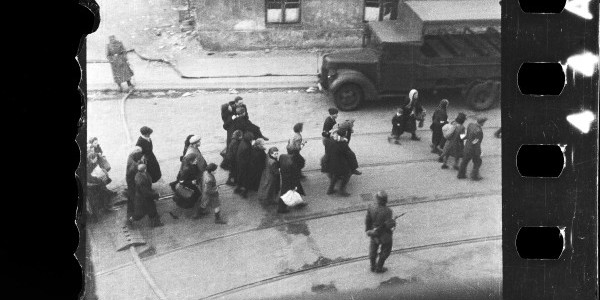Yom HaShoah 2023 / יוֹם הַשּׁוֹאָה 5783 Holocaust Memorial Day
Yom HaShoah for Hebrew Year 5783 begins at sundown on Monday, 17 April 2023 and ends at nightfall on Tuesday, 18 April 2023.
17/04/2023 | Na stronie od 18/01/2023

Source:Jewish holiday calendars & Hebrew date converter
Yom HaZikaron laShoah ve-laG’vurah (יום הזיכרון לשואה ולגבורה; “Holocaust and Heroism Remembrance Day”), known colloquially in Israel and abroad as Yom HaShoah (יום השואה) and in English as Holocaust Remembrance Day, or Holocaust Day, is observed as Israel’s day of commemoration for the approximately six million Jews and five million others who perished in the Holocaust as a result of the actions carried out by Nazi Germany and its accessories, and for the Jewish resistance in that period. In Israel, it is a national memorial day and public holiday.
It was inaugurated on 1953, anchored by a law signed by the Prime Minister of Israel David Ben-Gurion and the President of Israel Yitzhak Ben-Zvi. It is held on the 27th of Nisan (April/May), unless the 27th would be adjacent to Shabbat, in which case the date is shifted by a day.
Yad Vashem
Source:Yad Vashem
Overview: Holocaust Martyrs' and Heroes' Remembrance Day 2023
Jewish Resistance during the Holocaust: Marking 80 Years since the Warsaw Ghetto Uprising
Holocaust Martyrs' and Heroes' Remembrance Day (Yom Hashoah in Hebrew) is a national day of commemoration in Israel, on which the six million Jews murdered in the Holocaust are memorialized. It is a solemn day, beginning at sunset on the 27th of the month of Nisan and ending the following evening, according to the traditional Jewish custom of marking a day. Places of entertainment are closed and memorial ceremonies are held throughout the country. The central ceremonies, in the evening and the following morning, are held at Yad Vashem and are broadcast live. Marking the start of the day-in the presence of the President of the State of Israel and the Prime Minister, dignitaries, survivors, children of survivors and their families, gather together with the general public to take part in the memorial ceremony at Yad Vashem in which six torches, representing the six million murdered Jews, are lit. The following morning, the ceremony at Yad Vashem begins with the sounding of a siren for two minutes throughout the entire country. For the duration of the sounding, work is halted, people walking in the streets stop, cars pull off to the side of the road and everybody stands at silent attention in reverence to the victims of the Holocaust. Afterward, the focus of the ceremony at Yad Vashem is the laying of wreaths at the foot of the six torches, by dignitaries and the representatives of survivor groups and institutions. Other sites of remembrance in Israel, such as the Ghetto Fighters' Kibbutz and Kibbutz Yad Mordechai, also host memorial ceremonies, as do schools, military bases, municipalities and places of work. Throughout the day, both the television and radio broadcast programs about the Holocaust. In recent years, other countries and Jewish communities have adopted Yom Hashoah, the 27th of Nisan, to mark their own day of memorial for the victims of the Holocaust.
Holocaust Martyrs' and Heroes' Remembrance Day 2023 will be on Tuesday, April 18th. The State Opening Ceremony will be held at Yad Vashem on Monday, April 17th at 20:00.
More:
POLIN Museum, Warsaw: A unique discovery—photographic film with images of the Warsaw Ghetto Uprising
In 2023, POLIN Museum is running an annual program "Thou Shalt Not Be Indifferent. 80th Anniversary of the Warsaw Ghetto Uprising". The key element of the program is a temporary exhibition titled "Around Us a Sea of Fire. The Fate of Jewish Civilians During the Warsaw Ghetto Uprising" which will open in April. Professor Barbara Engelking, head of the Center for Holocaust Research at the Institute of Philosophy and Sociology, Polish Academy of Science, is the author of the exhibition concept, Zuzanna Schnepf-Kołacz of POLIN Museum of the History of Polish Jews is the curator. The exhibition is co-organised by the Association of the Jewish Historical Institute of Poland and the Center for Holocaust Research.